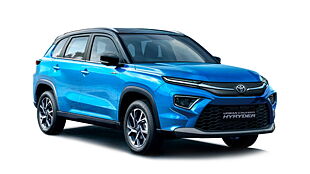Introduction

We’ll start by setting aside the elephant in the room – yes, the Toyota Glanza is a rebadged Maruti Suzuki Baleno. It is the first product spawned from the global Toyota-Suzuki joint venture of sharing powertrains and models and is built on the exact same production line as the Baleno. With the Glanza, Toyota was able to plunge into the lucrative premium-hatchback segment where it never had any presence before. So the Glanza rivals the likes of the Hyundai Elite i20, Honda Jazz, Volkswagen Polo, and of course the Maruti Suzuki Baleno apart from the upcoming Tata Altroz.

Toyota sells the Glanza in just two trim levels – G and V, with two engine options – both petrol. There are two transmission choice and five colour options to choose from. And it sells through Toyota showrooms and not Nexa. We’ll get back to this later, but before that, let us take a deeper look at what makes the new Toyota Glanza tick.
Design and style

Based on an already handsome-looking car, the Glanza is a looker no doubt. Save for the grille and the logo, this Toyota is identical in design to the Baleno in every single aspect. But we admit it manages to grab attention with its street presence and with all its curves and creases, or maybe it’s the badge people are looking at. Whichever be the case, the Glanza’s styling has a lot going for it.

It is large in terms of dimension measuring 3995x1745x1510mm and the flowing bulges makes it look much bigger in profile. Meanwhile, elements like the projector headlamps, LED day-time-running lights, stylish two-tone 16-inch wheels, LED taillights, and just the right amount of chrome garnish make the Glanza standout. On the other hand, the simple, circular fog-lamps could have done with more drama. Continuing its safe design philosophy at the back are bulbous tail lamps and a rather narrow tailgate.

What we do wish is- Toyota could have done some work in the design department to make the Glanza stand out in some way compared to its rebadged brethren. This lack of effort in terms of design takes away the brownie points the Glanza could have scored by enhancing an already handsome design.
Interior

As with the exterior, Toyota has simply carried forward the familiar looking cabin from the Baleno save for the badge on the steering wheel and the infotainment start-up screen. Retaining the cabin might not be an irrational decision after all since the Baleno is quite a practical car that has been successfully satisfying the needs of Indian car buyers. So you get an all-black cabin with blue contrast on the upholstery that breaks the monotony.

The centre console is dominated by a large touchscreen system above a silver-chrome finish console for the air-con control. Behind the steering wheel, which has adjustment for reach-rake, there are analogue dials for speedometer and tachometer between which is housed a TFT multi-information display giving out vital details like door ajar, realtime power and torque consumption, average fuel economy, clock and temperature.

So the overall fit and finish of the cabin are up to mark and there’s not much to point fingers at. You get a large storage area in the centre console, door pockets both fore and aft and there’s driver’s armrest with soft-touch cushion. In terms of space, there’s no surprise either. The cabin looks and feels spacious. We found the front seats to be large and broad while offering sufficient support and cushioning. There’s ample head- and leg-room in both front and rear rows for average heighted passengers. That said, the rear bench itself is comfortable enough to spend a long time on lengthy journeys. Not surprisingly, three passengers can easily sit abreast on the rear bench without much trouble.

What’s more, the rear-bench has a 60:40 split folding if the 339 litres of boot space isn’t enough. However, it needs to be pointed out that the boot enclosure is quite narrow and placed high, which makes loading heavy luggage a tedious task.
Safety and equipment

Coming late to the party, Toyota has guaranteed that the Glanza comes with all the bells and whistles. Included in the list of features are projector headlamps with LED strips, diamond-cut alloy wheels, and rear spoiler. On the inside, you get automatic climate control, auto-headlamps, UV-protect glass (not in G trim), push-button start, electric folding and adjustable ORVM, and driver’s side one-touch window up-down.

Debuting for the first time in a Toyota is Apple CarPlay and Android Auto connectivity with the new Smart Playcast system that comes paired with four speakers and two tweeters. Other features include rear wiper with washer, steering mounted controls with voice command, puddle lamps and follow-me-home lamps, to name a few.

Safety-wise, the Glanza has many features like ABS and EBD with brake assist, dual front airbags, ISOFIX with anchor points, engine immobiliser and reverse parking sensor as standard. Likewise, new safety features like seatbelt reminder (for both front seats), electrochromic mirrors, high-speed warning, anti-pinch driver’s window, reverse camera, seatbelt pre-tensioners and force limiters, and speed-sensitive door locks are fitted as well.
Engine and Performance

Toyota is offering the Glanza with two BS6 compliant 1.2-litre petrol engine options. One is a DualJet VVT which has a mild-hybrid setup and produces 89bhp and 113Nm. However, it can only be had with a manual transmission. What we are driving here is the standard K12B which can also be had with a CVT automatic transmission and it produces 82bhp at 6000rpm and 113Nm of torque accessible at 4200rpm.

As soon as the ignition is turned on, this petrol motor settles down into a near-silent idle. It feels refined while idling and even while getting off-the-mark. In addition to the good low-end, this motor feels at home in the mid-range of the rev-counter. Between 1500-3000rpm, there’s enough power and torque to keep it pottering around the city and stop-go traffic. Although the rubber band effect of the CVT is evident when flooring the throttle, it isn’t as pronounced as other CVTs we have experienced. Manage the throttle inputs correctly and the low- and mid-range grunt is more than sufficient to keep up with the traffic be it in city or out on the highway. The engine is tractable and there’s no lag between putting your foot down and the car picking up pace. But past 3000rpm is where the engine gets vocal. Even after ample insulation, you could hear the engine as it feels strained while approaching redline.

Thanks to the low kerb weight of just 950kg and a remarkably responsive engine, the Glanza was able to post an impressive time in our roll-on acceleration tests. It took 13.11 seconds to reach 100kmph from standstill while the moving sprint from 20-80kmph was dispatched in a decent 7.46 seconds. But even though the rubber band effect of the CVT was evident in the 40-100kmph run, the Glanza managed to do it in 9.92 seconds.

Push the ‘Sports’ button on the side of the gear lever and the characteristic of the engine and gearbox considerably changes. There’s an artificially controlled boost in the revs, which now sits almost 2000rpm more than usual. But, it pushes the engine to be more eager and responsive, and we admit that it makes driving the Glanza more fun and exciting. Also, it is all electronically controlled and might not feel natural at times. Its only other flipside is that in the Sports mode, the rev-counter dances past 3000rpm where the engine’s sound keeps filtering into the cabin, which may not be always welcome.

Ride and Handling:

In terms of ride quality, the Glanza seem to have it in the bag. The suspension is set to be quite absorbent. Thus, it manages to soak up most of what our roads have to offer without sending a jolt inside the cabin, even on much sharp-edged road surfaces at slow speeds and also remains flat, for that matter. And when the speed increases, you don’t hear the suspension working as you might hear in other cars in its segment. At higher speeds too, the ride remains flat and very composed taking astride all the undulations without much hassle. But then the suspension noise starts to creep in at triple-digit speeds. Yet it never gets to the point of being uncomfortable and bothersome.

Even the body roll is well controlled and it doesn’t make you feel nervous if you have to make sudden lane changes or when going through sharper corners. However, it doesn’t have the keenness to change directions like something as the Polo. As a family car, it does its job well by offering a stress-free drive with easy and light controls. But it is certainly not the car that you’d be happy to tussle around. We also noticed that the steering does feels vague off-centre. But once beyond the initial turns, the light steering is fairly direct and offers reasonable response for everyday driving. Surely, a little more heft to the steering would have made it a bit more lively and engaging to drive. Also, the brakes could do with some additional initial bite too.
Price and Fuel Economy

As mentioned earlier, the Glanza is offered in just two trim levels – G and V. The starting ex-showroom price for the Toyota is Rs 7.05 lakhs (ex-showroom) for the G manual and it goes up to Rs 9 lakhs for the V CVT trim. That puts it on par with its rivals but it has a much higher starting price. This might put off some of the buyers, especially when they are looking for an affordable petrol-powered hatchback. In terms of fuel efficiency, our petrol-CVT Glanza managed to return 16.19kmpl in the city while the on the highway it achieved 18.76kmpl.
Verdict

In the end, the Glanza comes across as a straightforward, no-nonsense product offering everything one could want from its class. It is spacious, practical, loaded with features and has decent driving dynamics too while being easy and fuss-free behind the wheel offering a fairly comfortable ride. But what does the Glanza offer better than its Maruti counterpart which could make you head to a Toyota showroom and not the Nexa? The answer is – Toyota is offering a standard warranty of 3 years/1,00,000 km on the Glanza compared to the Baleno's 2 years/40,000 km. And backing it up is Toyota’s own network of reliable and accessible after-sales service, which the carmaker claims to have improved furthermore to accommodate newer cars like the Glanza. So if you're a fan of Toyota cars, and wanted to deviate from the regular hatches without compromising on the product, then the Glanza may just be the one for you.
Pictures by Kapil Angane and Kaustubh Gandhi
Specifications
| CAR NAME | Toyota Glanza |
| Variant | V CVT |
| ENGINE | |
| Fuel | Petrol |
| Installation | Front, transverse |
| Displacement | 4 cyls, 1197cc |
| Power | 82bhp at 6000rpm |
| Torque | 113Nm at 4200rpm |
| Power to weight | 91.31bhp per tonne |
| Torque to weight | 126.2Nm per tonne |
| Gearbox | CVT |
| CHASSIS & BODY | |
| Kerb weight (measured) | 950kg |
| Tyres | 195/55 R16 |
| Spare | Full-size |
| STEERING | |
| Type | Rack and pinion |
| Type of assist | Electric |
| Turning circle | 9.8 |
| BRAKES | |
| Front | Discs |
| Rear | Drums |
| ABS | Yes |
Test Data
| CAR NAME | Toyota Glanza |
| Variant | V CVT |
| PERFORMANCE & BRAKING | |
| 0-20kmph | 1.74s |
| 0-40kmph | 3.48s |
| 0-60kmph | 5.83s |
| 0-80kmph | 8.96s |
| 0-100kmph | 13.11s |
| 0-120kmph | 19.08s |
| 20-80kmph in 3rd gear (kickdown) | 7.46s |
| 40-100kmph in 4th gear (kickdown) | 9.92s |
| 100-0kmph | 3.26s |
| 80-0kmph | 2.45s |
| FUEL ECONOMY | |
| City | 14.32kmpl |
| Highway | 18.76kmpl |
| Tank size | 37 litres |
| Range | 489kms |
| INTERIOR MEASUREMENTS | |
| Front | |
| Legroom(Max/min) | 860/630mm |
| Headroom | 970mm |
| Shoulder room | 1340mm |
| Backrest height | 600mm |
| Seat base lenght | 490mm |
| Rear | |
| Legroom(Max/min) | 870/650mm |
| Ideal legroom | 750mm |
| Headroom | 890mm |
| Shoulder room | 1300mm |
| Seat base length | 460mm |
| Backrest height | 580mm |
| Boot | 339 litres |
| Length/width/height | 710/1010/590mm |
| Loading lip height | 830mm |

![Toyota Glanza [2019-2022] Image Toyota Glanza [2019-2022] Image](https://imgd.aeplcdn.com/272x153/n/cw/ec/39545/glanza-exterior-right-front-three-quarter-159523.jpeg?q=80)
























